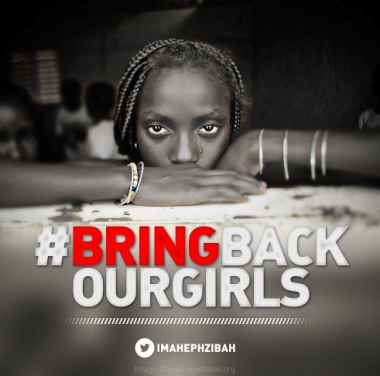#BringBackOurGirls: Mary J Blige, Kenneth Omeruo join calls for release of abducted Nigerian schoolgirls

Protesters have taken to the streets of Abuja as fears mount about the whereabouts of over 100 schoolgirls who were taken from their dormitories in Borno state, north-eastern Nigeria, by armed militia on 14 April.
It is not known exactly how many girls are still missing - reports vary between 100 and 230 – although around 50 others were also captured but have since managed to escape. Most are thought to be between the ages of 16 and 18, and had returned to school to take their final exams, despite education facilities in Borno being officially closed for some time due to escalating violence in the region.
Islamist militia group Boko Haram – meaning 'Western education is sacrilege' – is thought to be behind the abduction, which has prompted outcry throughout Nigeria as well as the wider international community.
Members of the Muslim extremist faction have caused thousands of deaths in recent years. Boko Haram have declared intent to cleanse the country of Christians, eradicate Nigerian democracy and replace it with an Islamic state guided by Sharia law, although some Muslim communities believed to have betrayed Islam have also been targeted.
Many believe the Nigerian government has been too slow to respond to the recent tragedy in Chibok, and on Wednesday around 500 Nigerians marched through the streets of the capital city to protest against the inaction, demanding that more be done to ensure the safe return of the schoolgirls.
Organised by the Women for Peace and Justice, those present marched to the National Assembly in Abuja where a letter was given that called for an urgent response from political figures.
According to the BBC, one of the organisers of the march, Mercy Abang, has called upon the government to use all necessary power and hold negotiations with Boko Haram to ensure the girls are returned home "alive – not in body bags".
Support for the movement has been gaining momentum on social media, with thousands tweeting the hashtag #BringBackOurGirls.
US Pop Singer Mary J Blige is among those offering her support, tweeting yesterday: "It's been two weeks since the kidnapping of 234 Nigerian girls and they still aren't home #bringbackourgirls". Her message has been retweeted almost 9,500 times.
Chelsea Football Club's Kenneth Omeruo – a Nigerian native – also took to social media to share his concerns. "#BringBackOurGirls #Nigerian girls ages 16-18 were kidnapped from their schools in Nigeria 2 weeks ago when an armed terrorist group broke into their school.. Repost pls to get attention and let's hope it touches hearts.. This is too extreme," he wrote on an Instagram post.
Malala Yousafzai, a young Pakistani activist who gained international attention in 2012 after being shot in the head by a Taliban gunman for speaking out about women's rights and education, told BBC Radio 4 that it is vital the Nigerian government do all they can to ensure the girls' safe return, while also protecting the education of women all over the country. She believes the girls were taken "because they were being educated".
"I want to make a request to the government of Nigeria that they should take [the education of girls] seriously, that they should take action, because in the end we will lose a whole generation," she told the Today programme on Tuesday.
"It's every girl's right to go to school to get an education and it's the duty of the government to protect then, provide them full safety and to make sure that these girls are safe while they go to school."
Nigeria's Interior Minister told BBC Focus on Africa that the government are unable to comment on their activity regarding the schoolgirls' return for safety reasons.
He insisted that discretion was needed as the militants have threatened to kill their young charges.











